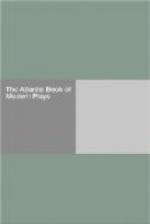Mr. Mackaye has adopted here a regularly rhythmic verse without the conventional capital letters at the beginnings of lines —perhaps to typify the simple homeliness of the talk.
Harold Brighouse: LONESOME-LIKE
Mr. Brighouse has been best represented in this country by an excellent comedy, Hobson’s Choice, which was widely played and was printed in the Drama League series of plays (1906). His other best-known work here is the present play, and The Price of Coal (1909), a picturing of the hard life of miners’ wives and their Spartan firmness in expectation of fatal accidents. He has produced and published a number of other plays, among them those listed in the bibliography. Mr. Brighouse represents in this volume the work of the English Repertory theatres, which parallel the Abbey Theatre in Dublin, the Glasgow Repertory Theatre, and various European stage-societies. That at Manchester, with which he has been associated, is directed by Miss Isabel Horniman, has seen beautiful stage-settings designed by Mr. Robert Burne-Jones, and counts among its dramatists such well-known men as Messrs. Allan Monkhouse, author of Mary Broome, a sombre and powerful tragedy; Stanley Houghton, and Gilbert Cannan. The Liverpool Theatre has become even more famous through the dramatic work of Mr. John Drinkwater. The Little Theatre movement in this country, our Drama League, and the various dramatic societies in our colleges and cities are our nearest parallel to these repertory theatres.
Lonesome-Like, Mr. Brighouse’s most effective short play, is written in a modified Lancashire dialect, the speech of the village weavers and spinners. Many of the words are English of Elizabethan days and earlier, derived mostly from Anglo-Saxon.
Gradely (graithly) means willingly, meekly or decently; clem means starve; sithee is see you or look you; clogs are shoes with wooden soles and leather uppers, and dungarees, garments of coarse cotton cloth rather like overalls. A is used throughout for I.
As in many English stories, an extreme and painful dread of the workus, or poorhouse, provides a strong motive force.
John Millington Synge: RIDERS TO THE SEA
The work of the Irish Renaissance in the Abbey Theatre in Dublin reached its most powerful and tragic height in this tragedy, which Mr. Yeats compared to the Antigone and (Edipus of Sophocles). Synge at first wandered about Europe, poetizing; it was Yeats who brought him back to study and embody in genuine literature the poetry of life among his own people. On the bleak Arran Islands he lived in a fisherman’s cottage, and through the floor of his room heard the dialect which he presents in simple and poignant beauty in this drama of hopeless struggle. The “second sight”—called “the gift” in Campbell of Kilmhor, and an incident also




